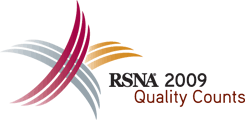
Abstract Archives of the RSNA, 2009
Marijke C. Jansen- Van Der Weide, Presenter: Nothing to Disclose
G.H. De Bock, Abstract Co-Author: Nothing to Disclose
Marcel Greuter PhD, Abstract Co-Author: Nothing to Disclose
Liesbeth Jansen, Abstract Co-Author: Nothing to Disclose
Jan C Oosterwijk, Abstract Co-Author: Nothing to Disclose
Ruud Pijnappel MD, PhD, Abstract Co-Author: Nothing to Disclose
Matthys Oudkerk MD, PhD, Abstract Co-Author: Nothing to Disclose
00030490-DMT et al, Abstract Co-Author: Nothing to Disclose
Women with familial or genetic aggregation of breast cancer are often offered breast cancer screening outside the population screening program, due to their high breast cancer risk and possibly young age of onset. However, the benefit of early tumour detection by mammography screening could be reduced by the risk of radiation-induced tumours. A meta-analysis on epidemiological studies was conducted and addressed the question how low-dose radiation exposure affects breast cancer risk among high-risk women.
We conducted a systematic search in Pubmed and EMBASE/Medline. The search strategy ´Breast neoplasms AND Mass screening OR Mammography OR neoplasms, radiation-induced” was combined with text words focusing on high-risk women. Pooled odds ratios (OR) were registered.
In total 34 articles were found of which 5 were selected by two reviewers. Four studies examined the effect of exposure to low-dose radiation among mutation carriers. One study researched the effect of radiation among women with and without a family history of breast cancer. Pooled OR revealed an increased risk of breast cancer among high-risk women due to low-dose radiation exposure (OR=1.63, 95% CI: 0.92- 2.90). Exposure before the age of 20 (OR=2.0, 95% CI: 1.4-3.0) or five or more exposures were associated with a higher radiation-induced breast cancer risk (OR=1.95, 95% CI: 1.5-2.6).
Low-dose radiation increases breast cancer risk among young women with a familial or genetic predisposition. A careful approach is needed when using low-dose radiation among high-risk women, and repeatedly exposure and exposure at young age should be avoided.
As mammographic screening doubles breast cancer risk among high-risk women, it is important to be careful with the use of low-dose radiation, especially at young age, and to avoid repeatedly exposure.
Jansen- Van Der Weide, M,
De Bock, G,
Greuter, M,
Jansen, L,
Oosterwijk, J,
Pijnappel, R,
Oudkerk, M,
et al, 0,
Mammography Screening and Radiation-induced Breast Cancer among Women with a Familial or Genetic Predisposition: A Metaanalysis. Radiological Society of North America 2009 Scientific Assembly and Annual Meeting, November 29 - December 4, 2009 ,Chicago IL.
http://archive.rsna.org/2009/8012231.html

